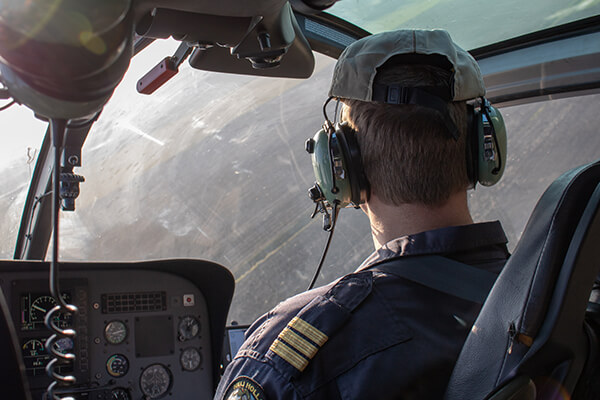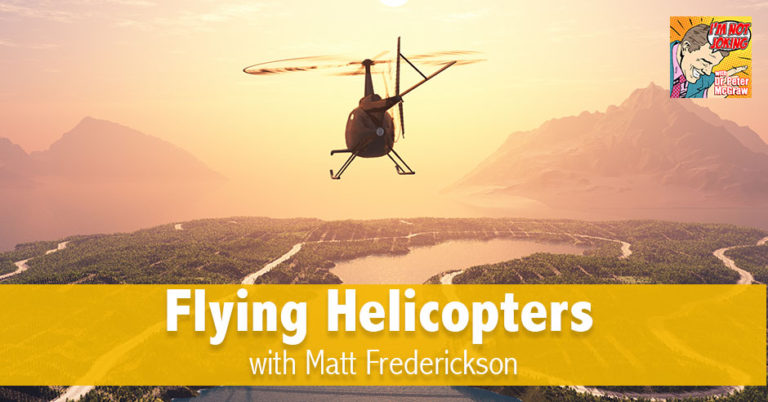—
Listen to Episode #28 here
Flying Helicopters with Matt Frederickson
Our guest is Matt Frederickson. Matt is a retired US Army Black Hawk pilot instructor. He currently works in the UAE as a Helicopter Pilot Instructor. I’m going to do something a little different. Instead of continuing on with the bio, I’m going to read a quote from one of my former students, Brandon Schafer’s emails who introduced me to Matt. He says, “Matt was one of my Black Hawk instructors when I was stationed in Clarksville, Tennessee. We have some great national memories together. He lives in Dubai. He’s one of the funniest and most offensive people I’ve ever met and might have some insights for you in Dubai. If he offers you absinthe just say, no.” If you weren’t a helicopter pilot and helicopter pilot instructor, what would you be?
The reason I originally joined the Army was that as a child, we played with guns and made homemade explosive devices. I looked across the board it naturally appealed to me as an adventurer. I wanted an adventure so I chose the military. I wanted to be a pilot, but it seemed so far-fetched to become a fighter pilot in the Air Force or the Navy or whatever. It seemed like an achievable dream at the time. I probably watched too many Rambo movies so I joined the Army. The Army, I wasn’t accepted originally as a pilot. I started out as an infantry soldier. I did that for a few years in the Hunter 1st Airborne. Finally, I got off my ass and I submitted my application to become a pilot and got accepted.
Did Top Gun had an effect on you?
I love that movie. As a child, some kids play with trucks and cars. I’d play with airplanes. I don’t know where that desire to be an aviator came from but it was always there.
Where was this? Where did you grow up?
I grew up in Cedar Rapids, Iowa. I was absolutely landlocked. There’s not a whole lot there. It’s a lot of farming. I knew no other people on the military besides my grandfather. He fought in the World War II. It came from nowhere. I can’t explain why I had this singular desire to be in the military and to be a military aviator.
You graduated high school and went right in?
I joined the military before I graduated high school. I was such an idiot. I thought it would be so much fire to get yelled at by a drill instructor and sleep on the ground on my summer vacation than go party like everyone else. I joined when I was seventeen. My mother had to sign the papers. They literally are like, “All we have is infantry, we’re sorry.” I was like, “Shit, that’s what I wanted. Thank you.”
You’re an Army recruiter’s dream.
I was probably the easiest recruit they had. I never lost sight of being an aviator. I particularly like helicopters too. I already knew that the Army pulled its pilots from inside the Army for the most part, probably 99%. That was always the ultimate objective.
Walk me through this a little bit. I’m familiar with the movies, books and television about boot camp. Is it 121st Airborne? Do you start by learning to jump out of planes?
Ironically, the 101st Airborne is considered an Air Assault division. We’re capable of moving the entire division by helicopter. Historically, it was an airborne division way back from World War II, the whole Band of Brothers invasion in Normandy and mainland Europe. It transitioned in Vietnam to helicopters. It became Airmobile to Air Assault/Airborne. We still hold the Airborne tab but we don’t actually jump out of airplanes.

I was rewatching Stanley Kubrick’s Full Metal Jacket. I don’t want to get too far off track, but that movie is fascinating because it feels a double feature. Were those in the Army?
Those are Marines. As I joined the infantry, it’s the same thing. They’re like, “Double O Bravo you made it.” I was Eleven Bravo. When I joined, the basic training was very similar, just getting yelled at and being called a piece of garbage. If you made eye contact with the drill sergeant in attention they’ll be like, “What are you, some homo?” and get in your face.
Has the Army cleaned some of that homophobic stuff up?
Absolutely. When I went to aviation, it was a culture shock to say the least from infantry to aviation. They had to deal with people a totally different way.
The movie obviously shifts to Vietnam. It’s disturbing and gritty.
Full Metal Jacket, although there are portions that are embellished, it’s the same. Warriors throughout time probably had the same disturbing humor. I always laugh at the part when they say, “We’re playing cowboys and Indians. Now, we’re playing cowboys and VC.” It’s just that same trance. I have a million stories myself of my own combat experiences. It would be inappropriate and disturbing or humorous.
I want to talk to you about that. That movie obviously does have a lot of gallows humor, but also the other thing that was striking about it was how terrified the guys were at various points. There’s a tendency I think in film to make these guys very heroic all the time, and very badass and aggressive. The fear they had was palpable at times in that movie. You finish up basic training. You’re in the infantry but you want to make the jump to pilot. You don’t want to be being transported. You want to be doing the transporting. You were how old?
I joined when I was seventeen. I was nineteen in Fort Campbell. Literally, since we flew on the helicopters all the time, they moved us around. We would freeze our asses off for literally a week it rained on. You think you’re going to die, but you don’t. One day I was so cold I was like, “If I could just stick my feet up my own ass to warm them up, I would.” It’s how retarded and being cold it is. We get on the aircraft and I looked at the crew chief and the pilots. It’s all warm in there. They will drop us off somewhere. We’re going to walk until it’s daylight again and hit some objective, and we know before we get halfway there, they’re going to be back home drinking a beer. I’m like, “I’m tired. I need to just do this and put in my application,” and so I did. To make a long story short, I was eventually accepted. It’s a process.
[bctt tweet=”We all focus on different things.” username=””]
What are they looking for? What is an application to go to flight school?
An Army flight school. I had to be a warrant officer. It is the same as a captain or lieutenant but captains and lieutenants, there’s one or two in the company. One captain, two lieutenants. They manage, they’re more of an administrator. They’re still pilots, everything they manage, the company. Warrant officers, we’re bred. We’re officers just the same, but we’re technical tactical experts on the employment of the aircraft and we advise the commander on how to best do that. We fly all the time and that’s our career path as pilots more of us. We’re mentors to the junior trainers, to the other aviators. A packet, it’s just a bunch of garbage. A lot of it is that they see you’re going to go through the nonsense of doing it. You need the letters of recommendation from your commander, another field grade aviator, like a high-ranking aviator, an experienced aviator. A bunch of nonsense paperwork, resume, a little paper on why you want to be an aviator. You do the FAST test called Flight Aptitude Standardization Test.
Is it a simulator?
It’s just a written test. What they did was after World War II, they took the pilots that lived. If you lived, you must have been a decent pilot because the attrition rates were so high. Psychologists went in and found out what made these guys successful. Literally half the test is, “Are your parents still married? How do you drive? Fast? Slow? Too fast, but safe?” Half the test is just those things, “What size a town did you grow up in?” It’s psychological. The other is a battery of tests like moving a dot inside of a circle just using symbols. These symbols may not be relative to left-right, up-down. You move a dot inside the circle and you have five seconds per question. I don’t think anyone ever finishes.

They want to get stability, good judgment.
Portions of it are a normal thing you’d find in an aptitude test, “If you pulled this pulley, which weight goes off the ground?” It’s bizarre. You only take it twice. If you pass the first time, that’s the score you have forever. Most people get 110. I got 116. You hear some stories of guys allegedly got a 130. I’ll be honest, I don’t remember all the details. It’s just a nonsense test. A lot of the application is just nonsense. They’ll just see if you’ll do it. You apply. They have a board and you look at the computer and see if you made it. Your name’s either in select or non-select.
Did you get in first?
Actually, I applied twice.
Earlier when you write out, you do not get in. Is that what it was?
You just join the regular Army. Once I decided to apply the first time, I came up as qualified but non-select for nobody knows why. No one knows anything. I redid everything and did it again on the next board. That time, the boards were six months apart. I got selected and then you go to Fort Rucker in Alabama and do their whole assessment there.
More attrition?
I think most everyone made it through what they call the Warrant Officer Candidate School. It’s basic training. They yell at you, come in and destroy your room but it’s a different style. As a warrant officer, you’re supposed to be a technical tactical expert. If there’s a new helicopter, they hand you the book and you need to know everything about it and teach everyone else how to do it and employ it. That’s the school. They hand you a book on how to fold your socks and hang everything. Your uniform is very particular. It has to be certain measurements, the whole thing. They don’t teach you how to do any of it. They’ll hand you the book.
Warrant officers are generally known throughout the Army as non-conformers. We’re in this middle ground. We transition. We’re a mediator between the enlisted side and the officer side. A lot of people get certain things at the Warrant Officer School, but what it taught me was how to beat the system. I don’t know if it’s the attention. I don’t think it is. They teach you how to beat the system. That’s what I got out of it. You do not have enough time to do all the things they want you to do. It’s impossible. You do academics during the day. You come back and your bed is flipped over. Everything’s all destroyed. Everything’s shanked out of your wall locker. You wake up on an exact time and you have exactly seven minutes to shower and do this stuff. The whole course is just a bunch of dudes running around, brushing your teeth while you walk through the water for two seconds. We don’t have enough time to do it. You realize, “On Monday, they can look at five things. Last time they looked at this for some. Maybe I won’t even do this. I’ll deal with it tomorrow.” You take the chance, you get in trouble.
[bctt tweet=”You can’t carry your normal morals to war. ” username=””]
When you make a mistake, you have to write a memo which you also don’t have time to do. You only have three minutes to write a memo for this perfect format, one inch from each side and it has to say this, your name a certain way. It has to say what you did wrong and how you are going to fix it. I realized too that you don’t have enough time to make this memo correctly and write something substantive. I realized, “These guys have 50 memos a day.” I just write a bunch of nonsense, not worried if it was even right. At first you focus on the formatting and of course, you can’t get it done on time, and you have to write a memo. You realize even if it’s completely fucked up, you just turn it in. The worst-case scenario is they make you do it again tomorrow in your lunch break. You get a chance to do any corrected memos during lunch break or they don’t catch it and you just slide through the cracks.
In behavioral economics, we call this satisficing. There are people who are maximizers and people are satisficers. There are conditions in which allow you to be a maximizer, but there are other conditions that don’t allow you to be a maximizer. The time deadlines for instance, where things have to be good enough. People are pretty good at making those trade-offs at times. They can be what we call adaptive. It sounds like you had to be quite adaptive. The people who succeed are the most adaptive. They’re willing to make those trade-offs.
Especially these courses going on since the ’60s, since Vietnam, since Army helicopters have evolved. It’s a conundrum too because the people that are most likely to be selected to be pilots are usually particular meticulous people. They want to do their best all the time. I think it translates well into the field. When you’re deployed to combat and you’re flying helicopters, sometimes it has to be good enough. It needs to be precise. Aviation is a precision sport. It would be awesome to throw away what’s not important where it’s a dynamic environment where there’s this huge symphony of things going on. This physiological thing, accomplishing the mission and piloting the aircraft, the radios, and technology. You didn’t know what to throw away and what’s important at that right moment. It actually works.
What do you mean by physiological?
Physiological, meaning that you don’t have the same sensation. The aircraft’s loud. All you can hear to the world is through your headset and radio. You are away from the ground. You’re traveling at high speeds. The noise, the vibration, the stress. There are a lot of the physiological factors that work at the same time as doing your job, piloting the aircraft and communicating to the ground force commander. You’re just facilitating the mission. The key players, the infantry or special operations unit on the ground, they’re going after bad guys.
I want to get back to the dark comedy stuff. You’re an instructor, you’re a teacher. Do you have a teaching philosophy? Tell me a little bit. I taught Brandon. I have a style. I have things that I want to try to get done. I have to imagine that you’re able to put a little bit of your own customization or your own personality into it.
Absolutely, through our own experiences, we all focus on different things.
I watched Top Gun. I know Jester was different than the other guy.
Everyone has different things that are important to them. Usually, some people might focus on different academic topics that are important to them, maybe systems in the aircraft, how the engine works. Some people might focus on aerodynamics. Maybe their previous instructors or oftentimes it’s some experience you had, you made a mistake somewhere. At least for me, I was never an instructor at a schoolhouse. I was always a unit instructor. My job was to prepare everyone to deploy to combat. While we were in between deployments, we have a training ramp up to deployment. We’d come back from deployment, it’s a reset. The aircraft go get fixed. They go into a huge maintenance schedule. We all go out and leave and then it starts right over again. In that sense, my focus was always on employment, like how to employ aircraft effectively. How to take it and land on the side of a mountain or assault operations, how to help the ground commander do his job and all those things that come with it.
[bctt tweet=”The way we share and express our humor can offend each other quite easily.” username=””]
Brandon even said this himself. I don’t remember his exact terms. On the ground, I joke around and everything but we get in an aircraft, I think I’m pretty serious. Brandon said at one time, “I thought you’re a real dick and then I got to know you.” You don’t have so much time on the aircraft. All these training objectives have to be complete. You don’t have time to mess around with it. You get in and you expect the pilot that you’re instructing to have been prepared like, “This is what I need from you before,” and you go right into it. It’s fast. If you’ve been through flight school, you’ve been through walks. You’ve been through all these other trainings. It shouldn’t be unusual. People say flight schools are like drinking from a fire hose, it’s the same thing. I don’t have time. I’m not saying I never joke and we never have a good time but for the most part, you’re in the seat in the aircraft. There’s not a lot of time to do other things other than to accomplish this specific training objective.
Are there inside jokes? Are there like lawyer jokes, like lawyers at the bottom of the ocean? Are there helicopter pilot jokes, something that only helicopter pilots would get?
Sure. The one I always thought was funny that I could think of is like, “Don’t tell my mom I’m a pilot, she thinks I’m a piano player in a whorehouse.” I always thought that one as funny. It’s from Vietnam. One thing I do say a lot in aircraft is people, they’re in a hurry. I was like, “Don’t rush the scene of the accident.”
This dark comedy idea is an interesting one. There’s research that shows nurses, EMTs, folks who work in emergency rooms, there’s not a research on it that I know of but I’m sure people who work in funeral homes and prisons laugh about and make jokes about things that other folks would find quite disturbing and appalling. There’s a scene in Full Metal Jacket where they’re posing with a dead Viet Cong soldier and making jokes about it. Taking pictures and laughing. I have a hunch why that stuff happens, but I’m curious what your experience was with that? You were a pilot during wartime. What was your reaction to that? I’m sure you saw and heard lots of it.
We were involved in it. I’ve said horrible things too. I think Full Metal Jacket is an accurate representation. Those things happen. The Marines call that a Marine Corps birthday party. I think they said that in the movie.
What is that?

They propped the bodies up. Of course, it’s not okay. I don’t want to just say it’s a coping mechanism because the things that I’ve seen that would be completely inappropriate back here, they are legitimately funny at the time. I don’t know particularly why that is. There’s all this talk about PTSD and this and that and that and this. I think the people have the problems with those things or they carry their morality that you would have, your way of doing things from Middle America to combat. You can’t do that. They’re not compatible. You have to have a different set, not of values, but perceptions of identity. A friend of mine was involved in a scenario where they were on a machine gun in overwatch on a battle early in Iraq. They just have positioned perfectly, they’re looking down the road.
This is where the enemy was moving through the city to attack the Americans on the other side. He guns and beat some fighters down in the street and some kids ran out and grabbed the rifle and ran back the other way. He knows what they’re doing. They sent the kids out to grab the gun to take back so another fighter can arm himself and go fight the Americans. He and his assistant gunner said, “What happens when they come out?” He’s like, “I’m going to shoot them,” and he did. He had a hard time with that and struggled with it. He had difficulty until he finally went to a psychologist or some counselor or whatever. The counselor’s like, “Would you do that in America?” He says, “Of course I would never do that.” He’s like, “You did it there. Did it save lives? Was it ultimately the right thing?”
You come to that realization. Of course, it’s not good but did it do good? If you want to save American lives, yes. It’s a conundrum. It’s a personal thing everyone has to deal with. They had parents. Where were their parents? Would you as a parent send your kid out, “Go grab that rifle from your Uncle Ahmed’s dead body and bring it back so we can fight the Americans.” They’re irresponsible. They chose to be combatants at that point. You can’t carry your normal morals to war. It’d make things simple as a coping mechanism. You’ve come up with disturbing humor to make light of these situations that might otherwise be tragic. I think we all have them.
[bctt tweet=”It’s okay to disagree. It’s okay to be friends and not necessarily agree with everything.” username=””]
The takeaway from this work is there’s nothing wrong with these people who are making jokes at these seemingly inappropriate things. This is my belief, and this is just theoretical at this point. Some of it is coping. Some of it very clearly is a way to deal with tragedy, a way to deal with stress, adversity and so on. That’s typically a pretty healthy thing to do.
In the previous podcast, I was talking about post-traumatic growth. Some people go through these kinds of things and as a result, they are better off than they were before. Some of this is just a normalization of the abnormal. You did your homework as the conscientious pilot that you are. You watched my TEDx Talk, which talks about a theory of humor, the idea that we laugh at things that are wrong yet okay. I call them benign violations. It’s a pretty easy way to think about this. If a world that is wrong, that is filled with mayhem, pain and suffering becomes normalized, it becomes a regular part of your life, part of your job, a part of this different identity that you have as an emergency room nurse, mortician, or a member of the military, that’s ripe to be laughing about things.
It’s in part because you know that they’re wrong. They don’t cease to be wrong. None of these becomes totally okay to kill another person or to have to deal with someone who’s been badly injured or has died. One of the amazing things about human beings is their ability to adapt. The good side is we can adapt to bad things, the bad things we adapt to good things, but it’s only the adaptation to bad things that can lead to comedy. The people who judge and feel upset about that just lack the perspective that what these people are doing is as fundamental to being human as experiencing joy, pride, embarrassment or regret.
People without those experiences, they can appreciate where it comes from. My friends and I, we talk about the same thing, about the sick sense of humor in this and that. If you didn’t do that, it would most probably mean you had a problem, you’re a sociopath. You felt nothing about it. At least the outlet of humor, obviously it’s a natural emotional response to these things. We all have these experiences. They come from nowhere too, that’s the funny thing. I always remember one particular experience that caught my attention. It was a time in Iraq when the roadside bombs were killing a lot of Americans. It was a real problem.
The Iraqis knew as well through the police and everything that, “If you’re on the side of the road with a shovel, you’re a target.” We have specific rules of engagement, the criteria of which we can engage another person with deadly fire. It was such a problem that if you’re digging on the side of the road, then you can be engaged. Most Iraqis should know and probably shouldn’t dig on the side of the road because you’re going to look like you’re putting a roadside bomb. It was time and our flight observed an individual on the road with a shovel, hiding in some bushes. We engaged him and of course killed the individual. They came back later.
It was a sixteen-year-old kid. Everyone’s like, “We’re operating under your rules. That was a MATZ decision to do this. It was the US Military’s decision that he met the criteria.” There was a lot of trouble. We’re getting frustrated about it. It came out like, “He’s just a sixteen-year-old kid. He was planting trees. That’s why he had a shovel. Those were the trees he was planting on the side of the road and you guys shot him.” One of the pilots is like, “Fuck. How was I supposed to know Iraq celebrates Arbor Day?” It’s a horrible thing. I’ve actually told that joke and the story. Most people in the military laugh. Everyone else finds it horrific. It’s a great way to not get invited back to the dinner party.
You have to be careful. Most of my friends are military guys and we all do the same things. We all get it. A lot of special ops friends joke about PTSD like, “I don’t need meds. I need a doctor to give me a prescription for a 24-pack a week.” I come here to Dubai especially. I came out of the Army here to Dubai and I’m downtown. There are 200 different countries represented in the city. I never paid a lot of attention, but I was reading one of your papers where you talked about you get the audience. You have to know your audience. It’s true. You have to be careful to not offend people, to not upset them if you want to coexist.
Be compassionate. Go through life without doing harm. I get this sometimes in my class where I tease folks or I’ll give them a hard time. Sometimes I’m doing it for entertainment value to make the class lively and enjoyable. Sometimes I’m doing it because I want accountability. The key is I would rather upset someone because I wanted to have accountability than to entertain. Let’s talk a little bit about comedy and humor in Dubai. You’ve been here how long?
Four years.

Happy here?
It’s a very interesting place.
There are places where it’s hard to find comedy. I was in New Zealand. The Kiwis are incredibly funny and friendly people. In the South Island, damned if I could find any comedy or comedians. I’ve had more luck here. I have a podcast set up with a comedian. On one hand, being multicultural is good for comedy. It helps to have an outsider perspective if you want to make jokes about a place. On the other hand, it hurts when it comes to the audience as you were reflecting back some of my work. If humor comes from perceptions that something is wrong yet okay, it helps if the audience all agrees that X is wrong and okay. It has to be in both of those things. When you have a diverse audience whether it is age, gender, culture, it’s hard for everybody to agree on what’s wrong and what’s okay. I think it’s one of those opportunities.
There are almost 200 nationalities represented in Dubai. When you’re out, usually I’m one of the only Americans. There are not many here. There are lots of British. On the weekend, any group that we would have would be French, Norwegian, British, Australian and German. It’s just a very wide mix.
I met a bunch of Indian guys already.
We all have different perceptions of humor. Sometimes they clash even among Westerners. You would think an American and British person, we have a similar culture but we don’t always share humor. What I’ve found is the way we share and express our humor can offend each other quite easily. A lot of people say especially Americans, “That’s British humor because they give each other a hard time. That’s what they do.” If you just meet someone for the first time and they talk a bunch of trash about you or America or how you talk or how you use the language. They’re like, “Who’s this guy?” You have to have thick skin and appreciate other people’s culture and how they interpret things.
[bctt tweet=”You don’t have time for things that don’t matter. ” username=””]
You were saying everybody loves Brandon.
Brandon’s an interesting person who’s able to easily cross different characters of people.
I could see that having him at my classes too, but he says that people either love you or hate you.
That’s his words.
Why do you think that is?
I don’t know.
Are you okay with it?
I am who I am. I don’t say I like to be offensive but I like to push the barriers. When it works, it’s fun. I don’t say be offensive, that’s not the objective. It’s fun just to push the dynamic of people. I find people interesting. That’s why I love this town. There are so many different people. I find people interesting and to challenge them. Instead of just agreeing with everything they say, you can say different things. Maybe on the edge for them and I don’t have a problem with it because I am who I am. I don’t want to put on a facade or a face. I can in the right scenarios, everyone can, but that’s no fun. It’s no fun being with a group of people and you agree with them about everything they have to say. It’s okay to disagree. It’s okay to be friends and not necessarily agree with everything.
You were saying that when you were young, you were combative, playing war, playing army, blowing things up and so on. You’re in the Army, you become a pilot. Do you think it’s the same personality trait? You’re willing to bump up against things in life that are scary and that are uncomfortable.
It’s the same concept. You’re not afraid of the potentiality for conflict. At the same time, the other half of the story is that the things I say or might joke about or people ask me a question about something, I give them an honest answer. It also builds strong friendships too. Like Brandon, I was flattered he said I was the funniest person he knows because I just remember it as just a bunch of nonsense, gossiping about a bunch of nonsense and bringing a huge bottle of absinthe I smuggled into the country.
The research is pretty clear on this. The funniest people also risk being the most upsetting people, comics or otherwise. Humor plays on arousal. It plays on these things that are threatening, that are wrong, that is inappropriate. In The Humor Code, we talk about these two methods of creating comedy, one we call the Seinfeld method which is you take something that seems benign and you point out the violation there. The nice thing about the Seinfeld method is that when you fail, you create a pallid emotionless reaction. The audience yawns because the alternative is a world that’s benign, that’s okay. The other method is what we call the Silverman strategy. You, Matt, are a Silverman strategy person. What Silverman starts out with is the thing that’s wrong, and then she tries to find a way to make it okay.
When she’s successful, she gets huge laughs but plays on these big violations in the world. When she fails, people are aghast. You’re comfortable playing in that world if I’m hearing you correctly. This is just me trying to explain this, having met you for 45 minutes. If you’ve had people shoot at you and try to blow you up, drill sergeants screaming in your face for looking at them the wrong way, if someone’s a little uncomfortable because you told a joke that didn’t land right, it’s not too bad.
Only people’s feelings are getting hurt. It’s not a tragedy.
Unpopular opinions, you seem like a guy who has many.
Virtually all of them would be considered unpopular.
Are you married?
I’m married.
Do you have an unpopular opinion with your partner?
No, ironically it’s my second marriage. We just got married. She’s much younger than I am. She’s from Boston. I grew up in Iowa, but then I moved to Tennessee in the South. We have real diametric of ideas. Everyone I know from Boston, I hated.
The nickname is Massholes for folks that haven’t heard that.
I have an Italian friend I went to visit. She has a PhD in Foreign Language and Literature. She asked me the nuances of American language. I told her about Boston, “Drive my car. Go to the party,” just joking around. Everyone I met from Boston, I hate them. They’re jerks and she’s like, “My boyfriend’s best friend, his wife is from there. We should go meet them.” They go like, “Where you from?” I’m like, “Iowa, Tennessee.” She’s like, “I’m from Boston.” Then I ended actually marrying someone from Boston.

My point is that we are a lot different. Maybe I’m a convincing person that she’s become much more, not to label myself but you could probably assume since I spent time in the Army, more conservative, more central. I’ve spent a lot of time traveling the world. I spent a lot of time in combat and flying helicopters and you don’t have time for nonsense. You don’t have time for things that don’t matter. My belief system is refined so much at certain things. Most of my opinions are unpopular especially Europeans and things that account here. Being an American and ex-military, they already know I’m an imperialist. I already have an identity in their mind before I even opened my mouth and probably confirm it.
What are you reading, watching or listening to these days that you think are superb?
I listen to lots of economic podcasts from economists. It’s ironic that I just started listening to VET Tv and these things we’re talking about. It’s really disturbing veteran humor.
Where does that broadcast?
It’s on Facebook. They have a Facebook page and they put previews of their things and some are five or six minutes long. They have their own channel you subscribe to. Nothing’s quite made me laugh like that in a long time and it is terrible stuff. In one episode the two soldiers are joking about, “Joe, he’s an asshole. I wish he’d get capped.” They’re like, “We want him to die or just be crippled.” He’s like, “I say crippled.” He’s like, “I wish he’d be dead. I’d hate to be twenty years from now being at the VFW in Sierra downtown at the bar and see those getting free beers in his wheelchair.”
Are these sketches or interviews?
They’re sketches. There’s one where a gunshot rings out. They all rush in and he’s like, “What happened?” The interpreter’s laying there shot. He’s like, “The interpreter tried to stab me. He actually did.” He shows his back. There was a knife wound in it. It’s just ridiculousness but if you’re looking to see the sardonic or dark humor of military people they’ve done a frightening job of, it’s good. That’s the main thing. I drive a lot here to work because the airfield’s away. Just lots of economic podcasts and VET Tv.
[bctt tweet=”What you’ll find with most successful people is they’ve taken risks and they failed, but they take the risk again.” username=””]
Last question, what is the secret to success that everybody knows, but can’t seem to do?
The secret to success is taking risks.
Tell me more. Why is it that the secret to success that everybody knows but can’t seem to do is taking a risk?
I’m here in Dubai. I’ve been pretty successful in my military career and now I’m here. I have a lucrative job. It’s Dubai. I have a nice house, a pool in the back. I have a profile pic next to a Ferrari. It’s just ridiculous, it’s Dubai. People are like, “You’re lucky.” Even my mother, I took a picture of me in the pool. My mom was like, “You’re lucky.” I was like, “Yes, but it took me 40 years to get here.” My point is that people say you’re lucky. I said, “No, of course there is an element of luck, but I took a risk. I left my home to join the Army. I didn’t do anything magical. I just joined the Army, that’s it. I worked hard and I had an objective. I didn’t stop. I took risks. I put it in my packet. I worked hard.” My friends back home say, “You’re lucky.” I was studying books six-foot-tall about helicopters, aerodynamics, the human eye and all the nonsense you learned in flight school while you guys were partying and smoking weed.
It’s not luck. It’s an element of luck but it’s risk. You take risks. You leave home, you go fight wars. You come to Dubai. After all, I’d been through in my life, I left. I could’ve stayed in the Army and been quite comfortable as a senior pilot. No one made me do too much. I showed up, I flew. I evaluated people so I’m like, “I need you to do everything. I’m going to show up to make sure you do it right.” That’s it. It was not terribly hard at that level. I could have stayed there but for some reason, I take this risk to go with this Dubai to a Middle Eastern country.
I knew Emirates and I knew about Dubai. Until you get here, you don’t understand. I didn’t know if we’re going to get here and we’re going to be wearing abayas. There are lots of rules and controls on alcohol and men and women living together. It’s their culture and I respect that. My point is it’s a risk. You go to this crazy place and it paid off. That’s what you’ll find with most successful people. They’ve taken risks and they failed and they take the risk again.
To me, I believe this because what you’re talking about correlates earlier. Risks and rewards are correlated. If you want something that’s rewarding in the world, fame, fortune or profound experiences, that means you have to take on some risk because if there wasn’t risk associated with it, then it wouldn’t be valuable. Everybody would have it. As someone who studies how people make decisions, we tend to represent people’s decisions as gambles with probabilities, with wins and losses. You can either balance a gamble either with probability or by making the game balance by a greater loss. Thank you for taking the risk to get on this podcast. I know it came out of the blue. It happened fast. I appreciate it.
Thank you for having me, it’s very interesting. I really enjoyed it. You don’t think about humor and you caught it for the first time. I thought about it, so thanks.
Resources mentioned:
- Matt Frederickson
- The Humor Code
- VET Tv
- Facebook page – Vet Tv
- YouTube – Vet Tv
- https://www.YouTube.com/channel/UCIwth2uQQRZzPKSflSLgk0g
- https://www.YouTube.com/watch?v=x9f6JaaX7Wg
About Matt Frederickson

